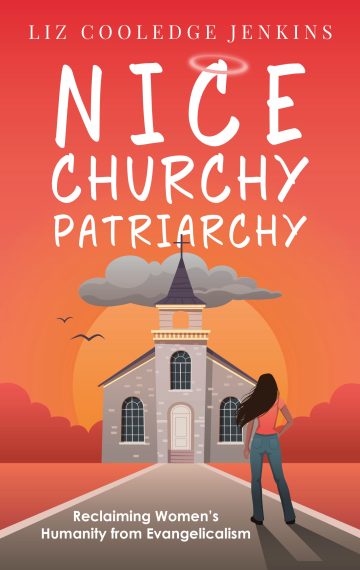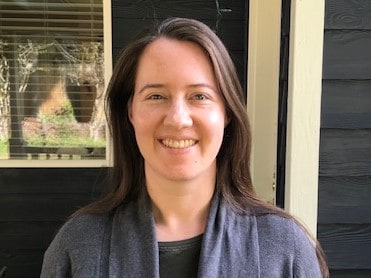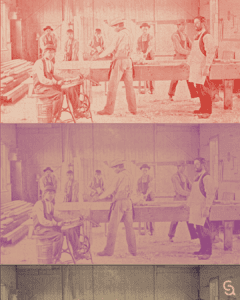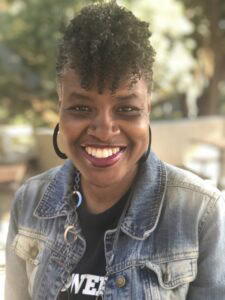 Even in the warmest and most welcoming evangelical churches, patriarchy looms as an ever-present force, suppressing women’s possibilities and debilitating whole communities. Well-intentioned churchgoers and church leaders have bought into deeply-entrenched male-dominated mindsets, power structures, and theologies that are not working—not for women, and really not for anyone. In celebration of Women’s History Month, we talked with author Liz Cooledge Jenkins about her new book, which tackles this topic, Nice Churchy Patriarchy: Reclaiming Women’s Humanity from Evangelicalism. Liz shares about the inspiration of the book and her chapter on soft complementarianism (adapted and excerpted below for your reading pleasure!).
Even in the warmest and most welcoming evangelical churches, patriarchy looms as an ever-present force, suppressing women’s possibilities and debilitating whole communities. Well-intentioned churchgoers and church leaders have bought into deeply-entrenched male-dominated mindsets, power structures, and theologies that are not working—not for women, and really not for anyone. In celebration of Women’s History Month, we talked with author Liz Cooledge Jenkins about her new book, which tackles this topic, Nice Churchy Patriarchy: Reclaiming Women’s Humanity from Evangelicalism. Liz shares about the inspiration of the book and her chapter on soft complementarianism (adapted and excerpted below for your reading pleasure!).
Tell us about the title—Nice Churchy Patriarchy. What inspired that, and what does it mean to you?
I feel like I’ve been some combination of wise and lucky—mostly lucky—to avoid the worst kinds of patriarchal Christian communities. Churches whose beliefs and policies demean women in really egregious and obvious ways sometimes get a lot of attention. And it’s good that we’re talking about these things. At the same time, though, just because a church’s policies aren’t quite that bad, or because a church isn’t quite that oppressive toward women, doesn’t mean that there aren’t still issues of patriarchy that we need to address. The churches I’ve been a part of have generally been full of really genuine, kind, well-intentioned people—who nonetheless perpetuate patriarchal practices that do a lot of harm. Good-hearted people often think they’re just reading the Bible and trying to do what it says, but their understanding of the Bible is actually keeping the whole community from thriving fully. We have to talk about this. That’s what Nice Churchy Patriarchy is about: putting words to these “nicer,” subtler forms of patriarchy that still oppress women and damage everyone—and figuring out how we can do something different together.
What inspired your chapter on soft complementarianism? How do you see it as uniquely harmful?
In the “soft complementarian” church I was a part of, I got pretty far into church leadership before I really felt held back and limited by the patriarchal theologies and practices of that community. Women were encouraged to use their gifts and lead in many ways, just not all the ways men were. And I think women in complementarian faith communities are often, in effect, asked to look around and think about how much better they have it than other women at other churches where the restrictions are even more severe. We’re conditioned to think that maybe the gendered limitations we do experience aren’t that big a deal. It took me several years to realize that any sort of gendered restrictions really are a very big deal. And that all sorts of unexamined sexist attitudes lurk behind these restrictions—so they really impact all women, even those who aren’t interested in being church leaders. It’s not enough to have fewer restrictions than we might have somewhere else. Women deserve full equality, and everyone is better off when people of all genders are considered fully equal.
In the excerpt below (Chapter 3), you start off telling us about Faith Bible Church—can you give us some context on this faith community? Is this a real church or an amalgamation of faith communities you’ve been in?
“Faith Bible Church” is a pseudonym for the “soft complementarian” church I was a part of for 11 years in the San Francisco Bay Area. I started attending this church during my freshman year at Stanford and stayed there through most of my twenties. I wanted to tell specific stories from my time there because I think stories are so powerful and so healing; they illustrate the forms patriarchy takes in such concrete ways, and people find themselves in them. My intent in sharing these stories isn’t to call out or criticize any particular organization—most of these stories really could have happened just about anywhere, and I keep hearing from women of all sorts of church backgrounds how deeply they relate. I leave the church unnamed because the point isn’t to shame a specific community but to draw on my experiences there to name the ways patriarchy operates, open doors for reflection, and help us dream together of what could be. This is all so much bigger than any one organization.
***
The following is an adapted excerpt from Nice Churchy Patriarchy: Reclaiming Women’s Humanity from Evangelicalism by Liz Cooledge Jenkins (Apocryphile Press, 2023). Used by generous permission of the author.
From time to time, Faith Bible Church would host a “Theology Roundtable” on a particular issue. These were really not so much round table discussions as they were theology lectures with a bit of Q&A. A Faith Bible pastor or guest speaker would talk for an hour or so about a fun, light-hearted, non-controversial topic―like hell, or creationism, or violence in the Old Testament. (In the round table on violence in the Old Testament, I got to see a seminary professor just about get run out of the church for suggesting that perhaps, historically speaking, not everything in the Hebrew scriptures happened literally as written.)
At one point, there was a round table on women in ministry. This was where I first learned the term “soft complementarian.”
I sat and listened as one of our pastors explained some of the different viewpoints people hold. Some Christians are “complementarian,” he said, which means they believe women and men ought to have different and complementary gender-based roles in marriage and the household as well as in church and ministry. Others are “egalitarian,” which means they believe women and men are meant to be equal partners in marriage and church, with no gendered role distinctions or limitations for women in leadership.
And then he described a sort of middle category: “soft complementarianism.” In contrast with―you guessed it―“hard complementarianism,” “soft complementarianism” is the belief that there should be some gendered differences between men’s and women’s roles in the home and church―but not quite as much as “hard complementarians” believe. Faith Bible Church, our pastor told us, falls in this category.
Faith Bible’s particular brand of “soft complementarianism” meant that female pastors were seen as legitimate―unless they preached regularly to the whole congregation. We had a female children’s pastor, a female junior high pastor, and a female women’s pastor, as well as a female volunteer counseling pastor. There were also plenty of other women on staff, working hard (and generally not getting paid enough for it) in various non-pastor roles, such as administration, communications, and finance.
If there was a gifted female preacher on the pastoral staff, the elders might ask her to preach occasionally (because God-given gifts should be honored and used)―but not very often, maybe two or three times a year at most (because women should absolutely not be determining the theological views of the church).
In Fierce, Free, and Full of Fire: The Guide to Being Glorious You, Jen Hatmaker tells a story about a time early in her career when she was invited to give a sermon at a megachurch. She was excited about the opportunity and had prepared extensively for it―in her words, “like it was my doctoral thesis.” Then, right before Hatmaker was about to speak, the (male) pastor stood up in front of the congregation and said this: “Ladies, you are in for a real treat today. Jen is here to share some stories with you, and I think you’ll be tickled. And men? We will just peek over their shoulders this morning until we resume our sermon series next week.”
Yikes.
The male leaders at my church might not have said such egregious things so directly. But the same kind of attitude seemed to lurk behind the church’s policies. Sure, women can preach, once in a while―but God forbid they might say something we find challenging, something that might cause us to see God differently. God forbid their words impact our theology, our practices, our lives. After all, we already know everything about God. Or if there is anything we don’t know, surely we need a man to fill us in.
Faith Bible had an influential former pastor, let’s call him Ted, who was well-known in certain conservative Christian circles. Former pastor Ted had been the main teaching pastor from Faith Bible’s early days in the 1950s all the way into the 1990s, and long-time churchgoers looked back fondly on his leadership.
At the round table on women in ministry, I learned, to my surprise, that former pastor Ted actually did not have a problem with women preaching. He didn’t believe it was in conflict with the Bible. Ted did not think that the Scriptures prohibited women from taking greater leadership roles in his congregation. At the same time, though, he knew his people. He saw that the congregation was not ready to receive a sermon from a woman. And so, he did not invite women to preach.
Unfortunately, Ted wasn’t wrong. The congregation really wasn’t ready for it. I know this because I saw that people still weren’t ready for it when I was there from 2006 to 2017. There were people in the congregation―both men and women―who refused to attend church on the rare Sunday when a woman preached. Meanwhile, the egalitarians among us kept attending church, week after week, dutifully listening to sermon after sermon preached by men and only men.
Former pastor Ted kept women out of the pulpit for many years, not because he believed it wasn’t biblical for women to preach, but because he didn’t want to split the church over it. He wasn’t really against women preaching; he just felt it was more important to maintain the unity of the church.
When I first heard this, I thought it was kind of noble.
Now, I think it’s a heaping pile of nonsense.
I’m sure Ted was doing the best he could, with what he knew, in the times he lived and led in. It’s not about him. It’s about all the church leaders out there, in all sorts of churches, who use unity as an excuse to trample over the gifts, well-being, and full equality of different subsets of their congregations―whether that’s women, or people of color, or queer people, or anyone else.
As Maya Angelou famously said, “I did then what I knew how to do. Now that I know better, I do better.” We can do better. Today’s world demands more. Women deserve more, and the church deserves more.
There are things worth upsetting people over, things worth losing churchgoers over—things worth splitting churches over, if need be. And getting men in power to “take their feet off [the] necks” of the women in their congregations and “permit [them] to stand upright,” as feminist and abolitionist Sarah Grimke wrote back in 1837, is surely one of those things.
***
 Liz Cooledge Jenkins is a Seattle-based writer, preacher, former college campus minister, and the author of Nice Churchy Patriarchy: Reclaiming Women’s Humanity from Evangelicalism. She blogs regularly at lizcooledgejenkins.com and can be found on Instagram as @lizcoolj and @
Liz Cooledge Jenkins is a Seattle-based writer, preacher, former college campus minister, and the author of Nice Churchy Patriarchy: Reclaiming Women’s Humanity from Evangelicalism. She blogs regularly at lizcooledgejenkins.com and can be found on Instagram as @lizcoolj and @


